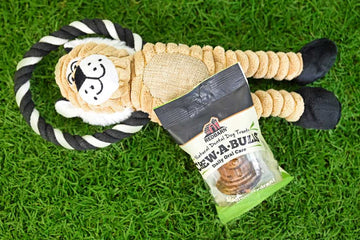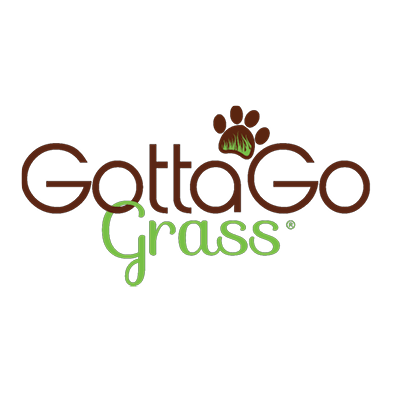Gluten-Free Dental Chews for Dogs: Are They Better For Your Pet?
by Jamie Tedder on Jul 21, 2025

If you’ve ever caught a whiff of your dog’s breath and thought, “Wow, something needs to change,” you’re not alone. Just like us, dogs can suffer from plaque, tartar buildup, and gum issues that affect their overall health and well-being. Poor oral hygiene in dogs doesn’t just cause bad breath—it can also lead to gingivitis, tooth loss, or even infections that spread throughout the body.
Dog dental chews step in as an easy, effective way to support your dog’s oral health. While brushing your dog’s teeth and scheduling professional cleanings are essential, adding a daily dental treat can supplement your efforts in keeping their teeth clean and healthy gums strong. Today’s market offers plenty of options, from traditional chews to those inspired by gluten-free dog food, often made with limited, natural ingredients.
But what exactly does “gluten-free” mean in dog chews? Are these just another trend, or do they truly offer better benefits for your pets?
What Are Dental Chews and Why Do Dogs Need Them?
Dental chews are designed to do what brushing sometimes misses—scrub away food particles, fight plaque, and help control tartar buildup. Their unique textures, ridges, grooves, and shapes reach those tricky spots where food and bacteria like to hide.
But the benefits go beyond keeping teeth clean. Chewing stimulates saliva production, which naturally rinses the mouth and promotes healthy gums. It can also provide mental stimulation, easing boredom and reducing destructive chewing behaviors. In other words, dental chews don’t just freshen breath—they support your dog’s overall well-being.
Do Vets Recommend Dental Chews for Dogs?
Yes! While brushing remains the gold standard, many veterinarians encourage dental treats as a daily supplement. Nevertheless, supervision is key. Some dogs may try to swallow large chunks, leading to choking or stomach upset. Always monitor chew time and provide plenty of fresh water.
What Does Gluten-Free Mean in Dog Treats?
You’ve likely seen gluten-free labels at the grocery store, but what does it mean for dog snacks? Gluten is a protein found in grains such as wheat, barley, and rye. In dog food and treats, gluten is often used as a binder or filler.
A gluten-free dental chew removes those ingredients, relying instead on alternative flours or starches. While most dogs tolerate gluten just fine, some may experience sensitivities or a food allergy that makes gluten-free a better choice. For pet parents seeking treats with no artificial flavors or unnecessary fillers, gluten-free options can feel like a cleaner, healthier choice.

Is Gluten-Free Okay for Dogs?
The short answer: yes. Most dogs digest gluten without any issue, but some are better off without it. If your dog has itchy skin, digestive upset, or frequent ear infections, your vet might suggest skipping gluten to see if it helps.
Beyond allergies, gluten-free chews often use limited, natural ingredients. That appeals to many owners who want a cleaner, more wholesome option for clean teeth and fewer potential irritants in their dog’s diet. For picky eaters, the improved flavors of gluten-free chews may also encourage consistent chewing habits—something that’s critical for oral health.
Grain-Free vs. Gluten-Free: What’s the Difference?
Here’s where it can get confusing. Grain-free means the product eliminates all grains, including wheat, rice, corn, barley, and oats. Gluten-free, on the other hand, only eliminates gluten-containing grains, such as wheat, rye, and barley.
That means a gluten-free chew could still include rice or oats, while a grain-free chew removes those too. Not all grain-free chews are gluten-free, and not all gluten-free chews are grain-free. Understanding the difference helps you make a more informed choice for your pup.
Why Do Some Vets Not Recommend Grain-Free Diets?
If you’ve heard that grain-free diets are controversial, you’re right. Studies from the FDA linked grain-free diets to cases of dilated cardiomyopathy (DCM), a serious heart condition in dogs. While the exact cause is still being studied, many vets caution against unnecessarily removing grains from a dog’s diet.
The takeaway: grain-free does not automatically mean healthier. Unless your dog has a diagnosed issue, a balanced diet with grains is often the safest bet. When it comes to treats, focus less on labels and more on what actually supports strong teeth, digestion, and your pet’s long-term health.

How Often Should You Give a Dog Dental Chews?
Most dental treats are designed to be given once per day, but always check the label. Overfeeding can add unnecessary calories and cause stomach upset. Think of them like dessert—good for your dog when enjoyed in moderation.
Remember to supervise chewing and discard small pieces that could cause choking. Keep fresh water accessible at all times to help wash everything down.
Keep Your Dog's Teeth Clean with Redbarn Chew-A-Bulls® Hydrant
If you’re curious about gluten-free dental chews, the Redbarn Chew-A-Bulls® Hydrant is an excellent option. Designed with a playful hydrant shape, these chews aren’t just fun—they’re functional. Their ridges and grooves reach those hard-to-clean spots, helping to fight plaque, control tartar buildup, and keep your dog’s mouth fresh.
Medium-sized dogs (30–50 lbs) can enjoy one Chew-A-Bulls® Hydrant per day as part of their routine. Always supervise your pup while chewing, and avoid giving these treats to puppies under six months or dogs weighing less than 5 lbs. The playful hydrant shape also adds a fun twist, making treat time more engaging—even for picky eaters.
So, Are Gluten-Free Dental Chews Better for Your Pet?
Here’s the bottom line: gluten-free dental treats for dogs can be a smart choice, especially for those with food allergy concerns or sensitive stomachs. They offer clean ingredient lists, help clean teeth, and support overall oral health—all without unnecessary fillers.
However, they’re not automatically better for every dog. The best dental chew for your pup depends on their diet, chewing habits, and your vet’s advice. What’s most important is choosing a dental treat that helps fight plaque, supports brain development through proper nutrition, and keeps your pup’s teeth clean, strong, and healthy.
Gluten-free chews like the Redbarn Chew-A-Bulls® Hydrant check all the right boxes: scientifically proven dental benefits, natural ingredients, and a design that makes oral care fun.
At the end of the day, the goal is simple—help your dog live a healthier, happier life with fresh breath, strong teeth, and a wagging tail.





